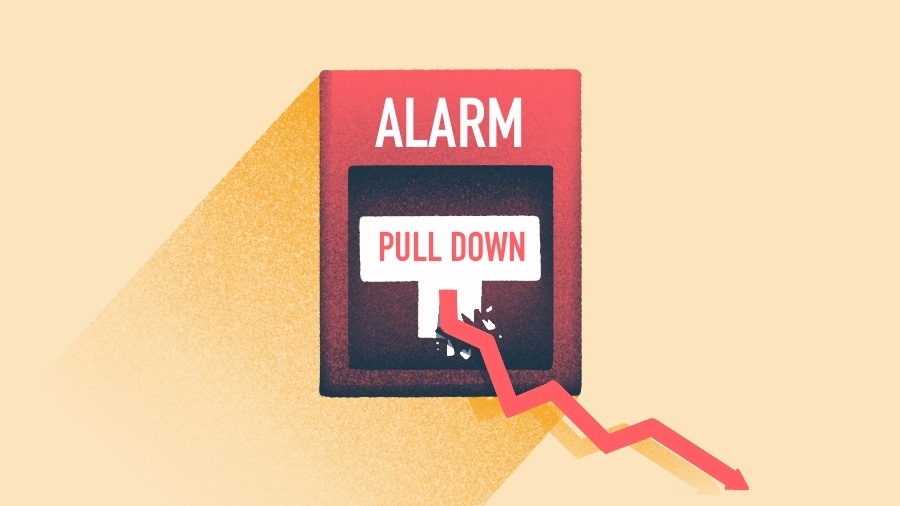Tariff-Induced Market Meltdown Worrisome For Startup Valuations And Exits

Unlike public companies, private startup valuations don’t fluctuate massively from day to day based on current events.
Eventually, however, private company prices do adjust to reflect trends in the broader markets.
And based on what we’re seeing today, things look worrisome.
The Nasdaq Composite Index was down a staggering 4.8% in midday trading today, following President Trump’s decision to impose sweeping tariffs on imported goods. His order calls for a 10% baseline tariff, along with much higher rates for many countries.
Among its myriad impacts, the decision is expected to lead to higher consumer prices and depressed demand as manufacturers and retailers pass along tariff costs incurred by their businesses. That was reflected in some of today’s more pronounced drops 1 for tech and consumer bellwethers, including Amazon (down 7%), Apple (down 8%), Nike (down 10%), and Wayfair (down 25%).
Startup correction delayed?
Now, over in startupland, we’re not seeing immediate revaluations. For hot startups, repricings might happen once every few months or quarters when there’s a new funding round. And ordinarily, it’s common for companies to go a couple years between revaluations.
That means the $300 billion post-money valuation announced for OpenAI this week, and the $113 billion valuation set for the newly combined X and xAI aren’t seeing an instant price cut like leading AI chip supplier Nvidia (down 5%).
But looking ahead, the trajectory appears concerning.
For one, it’s only a couple years since the last massive startup valuation correction. Scores of companies that enjoyed unicorn status around the market peak in late 2021 later settled for down rounds, folded or filed for bankruptcy.
In addition, the tech IPO market was sluggish in 2023 and 2024, and only just recently shows signs of warming up. We had a mega-offering last week from CoreWeave, which had a recent market cap around $24 billion. Large offerings from Klarna and Circle are also expected to hit markets in coming weeks.
In a similar vein, M&A was also on the rise, led by Google’s planned $32 billion purchase of cybersecurity unicorn Wiz, and a bump in billion-dollar-plus acquisitions.
So, for startup exits, we were finally getting out of a slump, only to face a new obstacle in the form of a tariff-driven market pullback.
Dumb + unpopular = a case for optimism
Looking for a case for optimism in the current scenario, I find myself turning to reality TV. The principle of this media niche has long been that one can succeed with something dumb, so long as it’s popular. However, if a show is both pointlessly stupid and not fun to watch, it will flop.
The same notion applies to a lot of other areas, including movies, music, romance novels, podcasts, and the list goes on. So why not new tariffs?
As public markets have demonstrated today, investors find the current tariff moves both dumb and unpopular. Hopefully, those with power to revise foolish decisions will take this as a reason to reverse course. I’m not giving it the highest likelihood, but it’s at least within the realm of possibility.
Related reading:
- With Google’s $32B Bid For Wiz, Big Exits Are Finally Picking Up
- A Booming Start To The Year For The Billion-Dollar Exits Board
Illustration: Dom Guzman
Based on prices at around noon ET.↩

Read More

Eye On AI: OpenAI’s Potential Windsurf Deal Could Be The Start Of A New M&A Trend
Tariff-Induced Market Meltdown Worrisome For Startup Valuations And Exits

Unlike public companies, private startup valuations don’t fluctuate massively from day to day based on current events.
Eventually, however, private company prices do adjust to reflect trends in the broader markets.
And based on what we’re seeing today, things look worrisome.
The Nasdaq Composite Index was down a staggering 4.8% in midday trading today, following President Trump’s decision to impose sweeping tariffs on imported goods. His order calls for a 10% baseline tariff, along with much higher rates for many countries.
Among its myriad impacts, the decision is expected to lead to higher consumer prices and depressed demand as manufacturers and retailers pass along tariff costs incurred by their businesses. That was reflected in some of today’s more pronounced drops 1 for tech and consumer bellwethers, including Amazon (down 7%), Apple (down 8%), Nike (down 10%), and Wayfair (down 25%).
Startup correction delayed?
Now, over in startupland, we’re not seeing immediate revaluations. For hot startups, repricings might happen once every few months or quarters when there’s a new funding round. And ordinarily, it’s common for companies to go a couple years between revaluations.
That means the $300 billion post-money valuation announced for OpenAI this week, and the $113 billion valuation set for the newly combined X and xAI aren’t seeing an instant price cut like leading AI chip supplier Nvidia (down 5%).
But looking ahead, the trajectory appears concerning.
For one, it’s only a couple years since the last massive startup valuation correction. Scores of companies that enjoyed unicorn status around the market peak in late 2021 later settled for down rounds, folded or filed for bankruptcy.
In addition, the tech IPO market was sluggish in 2023 and 2024, and only just recently shows signs of warming up. We had a mega-offering last week from CoreWeave, which had a recent market cap around $24 billion. Large offerings from Klarna and Circle are also expected to hit markets in coming weeks.
In a similar vein, M&A was also on the rise, led by Google’s planned $32 billion purchase of cybersecurity unicorn Wiz, and a bump in billion-dollar-plus acquisitions.
So, for startup exits, we were finally getting out of a slump, only to face a new obstacle in the form of a tariff-driven market pullback.
Dumb + unpopular = a case for optimism
Looking for a case for optimism in the current scenario, I find myself turning to reality TV. The principle of this media niche has long been that one can succeed with something dumb, so long as it’s popular. However, if a show is both pointlessly stupid and not fun to watch, it will flop.
The same notion applies to a lot of other areas, including movies, music, romance novels, podcasts, and the list goes on. So why not new tariffs?
As public markets have demonstrated today, investors find the current tariff moves both dumb and unpopular. Hopefully, those with power to revise foolish decisions will take this as a reason to reverse course. I’m not giving it the highest likelihood, but it’s at least within the realm of possibility.
Related reading:
- With Google’s $32B Bid For Wiz, Big Exits Are Finally Picking Up
- A Booming Start To The Year For The Billion-Dollar Exits Board
Illustration: Dom Guzman
Based on prices at around noon ET.↩

Read More

